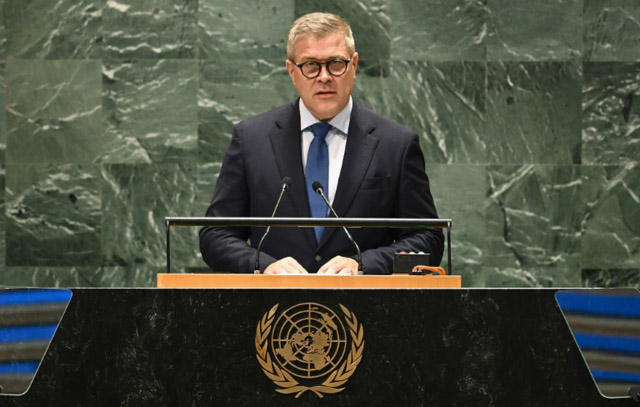News Flash
News Flash

REYKJAVIK, Nov 28, 2024 (BSS/AFP) - Icelanders head to the polls on November 30 after the collapse of a fraught coalition government prompted a snap election where the economy is a top concern.
Faced with persistent inflation and high interest rates, the economy, housing and healthcare are foremost in voters' minds in the country where some 268,000 people are eligible to vote.
In mid-October, Prime Minister Bjarni Benediktsson announced the three-party, left-right coalition government's resignation.
The coalition was made up of Benediktsson's Independence Party, the Left-Green Movement and the centre-right Progressive Party and was divided on issues ranging from foreign policy to asylum seekers and energy.
Eirikur Bergmann, a professor of politics at Bifrost University, noted that the coalition included two parties that were "the furthest out on the economic scale, on the right and on the left".
"Cooperation got increasingly difficult and there were more and more frictions," Bergmann added.
The alliance finally broke down over disagreements on the handling of migrants and asylum seekers.
Despite causing the demise of the government, immigration is not a galvanising issue for most voters, in the country where one in five residents is foreign-born.
"It is very prominent in the public debate amongst politicians, but still it does not seem to be an issue that people are putting at the front of their list of important issues," Bergmann said.
According to a Gallup poll published in early November, only 32 percent listed immigration as one of their five most important issues and only 18 percent included asylum issues among their five.
By contrast, healthcare, economic issues and housing were a top concern for 69, 62, and 61 percent respectively.
- Critical of governments -
The coalition has lost voter support during its time in power.
According to a recent poll published by broadcaster RUV, only 49 percent of those who voted for the Independence Party in 2021 planned to do so again.
For the government-allied Progressive Party, only 32 percent of those who voted for it in 2021 planned to stay with the party, according to the poll by analyst firm Maskina.
The Left-Green Movement meanwhile looks to retain less than a fifth of its voters and risks falling below the parliamentary cutoff of five percent, meaning it could leave parliament altogether.
In Icelandic politics few parties have left their time in power unscathed since the 2008 financial crisis -- which hit Iceland's over-indebted banks and the country particularly hard.
"In the last 15 years, voters in Iceland have been extremely critical of their governments and voted against the government in all elections except one," Olafur Hardarson, professor of political science at the University of Iceland, told AFP.
The exception was Katrin Jakobsdottir of the Left-Green Movement, who held on as prime minister in the last election.
Benediktsson took over as prime minister in April 2024 after Jakobsdottir resigned to run for the presidency, which she failed to win.
Icelandic voters, according to Hardarson, are particularly changeable and "in the last four elections in Iceland, between 40 and 50 percent of the voters have changed parties between elections."
This year, Iceland has experienced more than political turmoil.
The southwestern Reykjanes peninsula, which had not seen a volcanic eruption for eight centuries prior to March 2021, has had seven volcanic eruptions this year alone.
The eruptions have led to multiple evacuations of the small fishing village of Grindavik.
- New coalition -
On November 20, the country's central bank announced it was cutting its key rate by 0.5 percentage points to 8.5 percent.
While inflation has subsided it still came in at 5.1 percent year-on-year in October, compared to the bank's target of 2.5 percent.
Going into the election, the Social Democratic Alliance -- led by Kristrun Frostadottir -- is ahead in the polls with 24 percent, according to an early November Gallup poll.
Benediktsson's Independence Party polled in second place with 17 percent.
In third and fourth place were the Centre Party and the Liberal Reform Party -- with 16 and 14 percent of support respectively.
According to Hardarson, if the election results come in close to the polls, one likely coalition would be the Social Democratic Alliance and the Liberal Reform Party -- along with one or two others -- as their policies are relatively close.
But he noted: "This is difficult to predict because in Iceland the coalition game is relatively open."